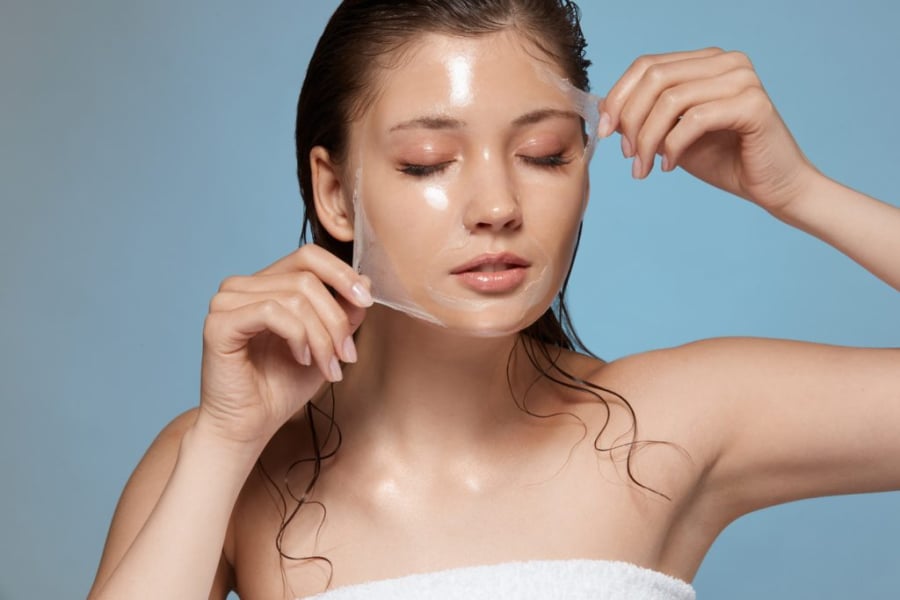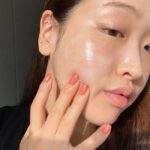When treating skin concerns such as acne, pigmentation, age spots, or even after intensive therapies such as laser and chemical peels, our skin often undergoes noticeable changes. The treatment process involves using potent ingredients such as retinol, tretinoin, AHA, and BHA, or more invasive beauty treatments such as laser and chemical peels, to address issues like wrinkles, pigmentation, age spots, and enlarged pores. However, during this journey, our skin may encounter some common conditions:
Skin Sensitivity and Irritability: The use of potent treatment ingredients can lead to skin thinning and increased sensitivity. This may manifest as redness, irritation, a stinging sensation, or even mild flaking. Strong treatment products often penetrate deep into the epidermis, making the skin more reactive and susceptible to damage.

Potent treatment products can disrupt the skin’s protective barrier.
Dryness and Dehydrated Skin: One common side effect of skin treatments is dryness and dehydration. These procedures can strip away the skin’s natural moisture barrier, making it prone to water loss and dryness. Without adequate hydration, the skin can become rough, flaky, and even prone to cracking.
Inflammation and Vulnerability to Infection: Post-treatment skin may experience inflammation due to a disruption in the balance of microorganisms on the skin’s surface. This often leads to breakouts or mild inflammation, causing discomfort.
Need for Skin Recovery and Regeneration: After undergoing these treatments, the skin requires time to recover and heal. At this stage, restorative nutrients play a crucial role in promoting cell regeneration and wound healing.
Skin Recovery
To effectively restore skin health after dermatological treatments, choosing the right products with suitable ingredients is paramount. Some key ingredients that can aid in skin recovery include:
Niacinamide (Vitamin B3): This ingredient soothes the skin, reduces inflammation, and exhibits antimicrobial properties. Niacinamide aids in healing mild damage and is well-suited for sensitive, post-treatment skin.
Ceramides: As natural lipids found in the skin’s protective barrier, ceramides help maintain moisture levels and restore the skin’s moisture barrier, shielding it from environmental aggressors.
Hyaluronic Acid: Hyaluronic Acid is an exceptional hydrator, enabling the skin to retain moisture, enhancing softness, and imparting a dewy appearance. It effectively addresses dry and dehydrated skin during the recovery process.

Hyaluronic Acid provides intense hydration to dehydrated skin.
Retinol or Retinoids: Retinol stimulates cell regeneration, boosts collagen production, and improves skin elasticity. However, if you’ve used potent treatment ingredients, opt for a gentle retinol formulation to prevent irritation.
Vitamin C: Vitamin C brightens the skin, reduces pigmentation, and shields against UV damage. It also aids in skin recovery, promoting even skin tone and enhancing overall skin health.
Skin Care Routine
To facilitate optimal skin recovery, a well-curated skincare regimen is essential. Here are the fundamental steps to care for your skin post-treatment:
Cleanse: Use a gentle makeup remover followed by a mild, alcohol- and fragrance-free cleanser to deeply cleanse the skin without causing irritation.
Tone: Toners help refine pores, balance the skin’s pH, and enhance the absorption of subsequent skincare products.
Serum: Serums containing active ingredients like retinol, niacinamide, or vitamin C deliver concentrated doses of nutrients to promote effective skin recovery. Apply 2-3 drops per application.
Moisturize: After serum application, seal in moisture with a lightweight, non-greasy moisturizer to keep the skin supple and hydrated throughout the day.
Sunscreen: Lastly, don’t forget to apply a broad-spectrum sunscreen during the day to protect your skin from UV damage. This step is non-negotiable, especially for post-treatment skin.
3 Foods That Cause Hair Loss: The First One May Surprise You
Hair loss is a common concern for many, but did you know that your diet could be a contributing factor? It’s true – what you eat can have a significant impact on the health and vitality of your locks. In fact, there are three common foods that, if not consumed in moderation, could lead to excessive hair shedding.





































